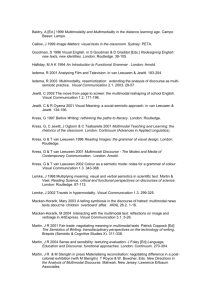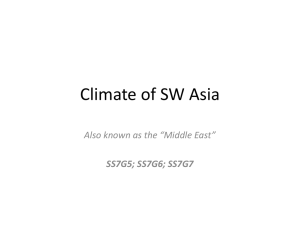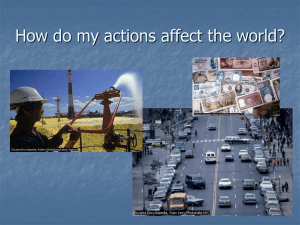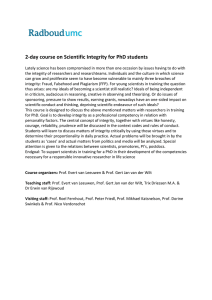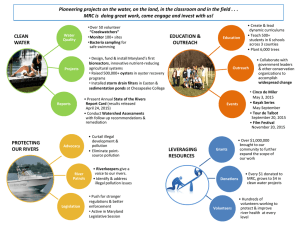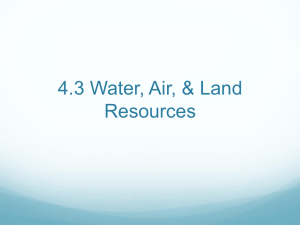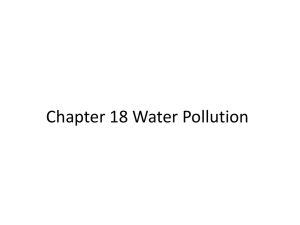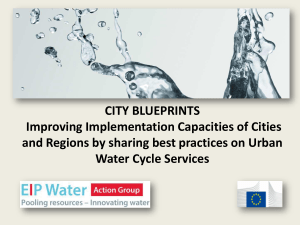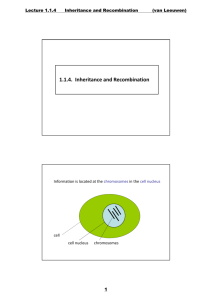Introduction to air pollution
advertisement
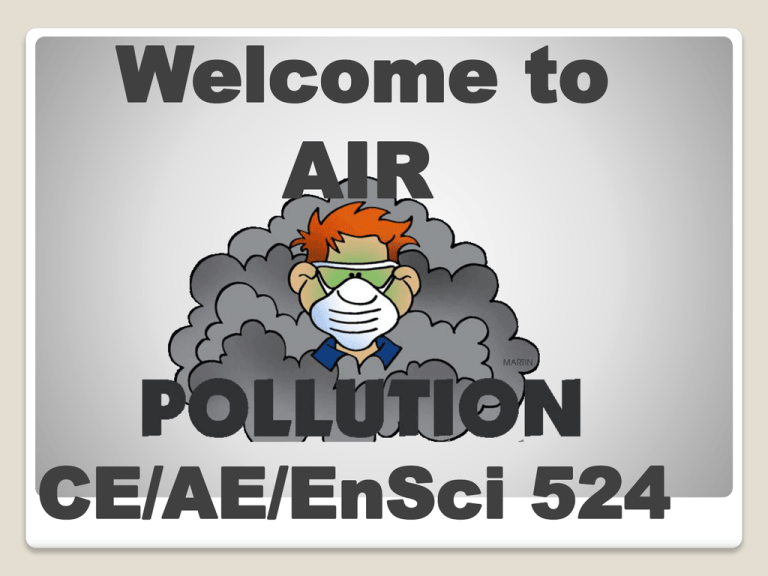
Welcome to AIR CE/AE/EnSci 524 Air Pollution CE/AE 524 An introduction By J. (Hans) van Leeuwen Instructors Class Meeting Time: Mon and Thu 1:30-3pm, 316 Town Instructors Dr. van Leeuwen 476 Town Engineering leeuwen@iastate.edu Dr. Koziel 3103 NSRIC koziel@iastate.edu Dr. Hallmark 402 Town Engineering shallmar@iastate.edu Source material Required handbook: Wark, K, Warner, CF and Davis, WT (1998) Air Pollution – its origin and control. AddisonWesley ISBN 0-673-99416-3 Other material prescribed: Masters, GM (1998) Introduction to Environmental Engineering and Science, 3rd Ed. Prentice Hall, ISBN 0 – 13 – 155384 – 4 Chapter 8 – Global Warming Other material recommended: Davis, ML and Masten, SJ (2004) Principles of Environmental Engineering and Science, 3rd Ed. McGraw-Hill, ISBN 0-07-119449-5 Chapter 15 – Noise Pollution The relevant chapters from these two sources will be made available for copying by students. Module A Week of Mon 1:30-3 Thu 1:30-3 Text (Day1/Day2) Instructor (Day1/Day2) Jan 10 Introduction Sources and effects of air pollutants Meteorology Ch 1, Van Leeuwen Koziel Jan 17 Jan 24 Jan 31 Federal Legislation Odor Dispersion Noise Pollution Dispersion Wark et al. Chapter 2 & 3 Koziel Van Leeuwen Wark et al. Ch 15 Davis & M Koziel/van L Chapter 4, Hallmark Wark et al. Feb 7 Particulates Global Warming Chapter 8, Masters Feb 14 Exam A Van Leeuwen Module B Week of Mon 1:30-3 Feb 7 Thu 1:30-3 Text Global Warming Ch 8, Masters Van Leeuwen Ch 8, Masters Van Leeuwen Van Leeuwen Koziel Exam A Instructor Feb 14 Global Warming Feb 21 Photochemical Reactions Volatile organic compounds Notes Feb 28 Flue gas treatment Air sampling and analysis Chapter 5/6 Wark/ Notes Van Leeuwen Koziel Mar 7 Air sampling and Indoor air quality analysis CO generation Notes Koziel Van Leeuwen Mar 14 Spring Break Mar 21 Indoor air quality Notes Koziel Exam B Ch 8 + Wark Modules D and E March-April Aerial Emissions from Agriculture Module E Notes Koziel Hallmark April Mobile Sources Not on offer in 2011 Notes April Industrial Air Pollution Control Term papers Module D Chapters 6/7, Van Wark Leeuwen April 19 April 26 May 3 Students present Final Exam Week (if needed) Aggravated air pollution - industry Aggravated air pollution – industry II Transportation related causes of air pollution SOx and NOx pollution Smog over Los Angeles Smog over the Sea of Japan Aerial spraying Natural sources Silent polluters Climate change KABUL Overindulgence Overindulgence Under indulgence? Passenger car emissions ratings HC HC CO NOx CO NOx Transitional Low-Emission Vehicle(TLEV) 50% NR NR Low-Emission Vehicle (LEV) 70% NR 50% Ultra-Low-Emission Vehicle (ULEV) 85% 50% 50% Super-Ultra-Low-Emission Vehicle (SULEV) 96% 70% 95% Zero-Emission Vehicles (ZEV) 100% 100% 100% MAKE DO WITH LESS MAKE DO WITH LESS http://www.arb.ca.gov/msprog/ccbg/zev.htm http://www.arb.ca.gov/msprog/ccbg/2002pc.htm Super Ultra Low-Emission Vehicles (SULEV's) Honda Accord Civic GX Insight DX gas CNG gas/IMA Nissan Toyota Sentra CA gas Prius gas/EA AIR POLLUTION REDUCTION FROM TOYOTA PRIUS TO HOMEMADE ELECTRIC BIKE Under indulgence? Indoor air pollution – some of the highest levels Origin of the course AIR POLLUTION CE524X New course to be offered in Spring 2002 Jointly by Environmental and Transportation Engineering Dr J(Hans) van Leeuwen and Dr Shauna Hallmark Tel 294 5251; leeuwen@iastate.edu 294 5249; shallmar@iastate.edu Department of Civil and Construction Engineering 382 Town Engineering Building Please register as soon as possible as enrollment is limited o Air quality legislation. Sources of pollutants. Physics and chemistry of air pollution. o Global warming - thermodynamics, heat balances, meteorological and geographic aspects, greenhouse effects and contribution of various gases. o Ozone formation in the atmosphere and stratosphere. Ozone destruction in the stratosphere, halons and freons. o Air pollution control measures - filters, electrostatic precipitators, settling chambers, catalytic converters, scrubbing towers and their design, deep-sea disposal of CO2. o Measurement and energy equivalents of sound, noise abatement. o Modeling air pollution for point sources. Regional air pollution modeling. o Modeling transportation sources. Abatement of transportation related emissions. o New technologies. New modeling techniques.


